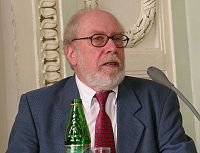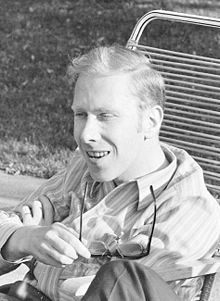- Niklaus Wirth
-
Niklaus E. Wirth 
Born February 15, 1934
Winterthur, SwitzerlandCitizenship  Switzerland
SwitzerlandFields Computer Science Institutions ETH Zurich,
Stanford University,
University of Zurich
Xerox PARCAlma mater ETH Zurich,
Université Laval,
University of California, BerkeleyKnown for Algol W, Euler, Pascal, Modula, Modula-2, Oberon, Oberon-2, Oberon-07, Oberon System Notable awards Turing Award, SIGPLAN Programming Languages Achievement Award, Fellow of the Computer History Museum Niklaus Emil Wirth (born February 15, 1934) is a Swiss computer scientist, best known for designing several programming languages, including Pascal, and for pioneering several classic topics in software engineering. In 1984 he won the Turing Award for developing a sequence of innovative computer languages.
Contents
Biography
Wirth was born in Winterthur, Switzerland, in 1934. In 1959 he earned a degree in Electronics Engineering from the Swiss Federal Institute of Technology Zürich (ETH Zürich). In 1960 he earned an M.Sc. from Université Laval, Canada. Then in 1963 he was awarded a Ph.D. in Electrical Engineering and Computer Science (EECS) from the University of California, Berkeley, supervised by the computer designer pioneer Harry Huskey.
From 1963 to 1967 he served as assistant professor of Computer Science at Stanford University and again at the University of Zurich. Then in 1968 he became Professor of Informatics at ETH Zürich, taking two one-year sabbaticals at Xerox PARC in California (1976–1977 and 1984–1985). Wirth retired in 1999.
Programming languages
Wirth was the chief designer of the programming languages Euler, Algol W, Pascal, Modula, Modula-2, Oberon, Oberon-2, and Oberon-07 . He was also a major part of the design and implementation team for the Lilith and Oberon operating systems, and for the Lola digital hardware design and simulation system. He received the ACM Turing Award for the development of these languages and in 1994 he was inducted as a Fellow of the ACM. He designed the simple programming language PL/0 to illustrate compiler design. It has formed the basis for many university compiler design classes.
Notable publications
His article Program Development by Stepwise Refinement, about the teaching of programming, is considered to be a classic text in software engineering. In 1975 he wrote the book "Algorithms + Data Structures = Programs", which gained wide recognition and is still useful today.
Wirth's law
Main article: Wirth's lawIn 1995, he popularized the adage now known as Wirth's law: "Software is getting slower more rapidly than hardware becomes faster." In his 1995 paper A Plea for Lean Software he attributes it to Martin Reiser.[1]
Quotes
"Whereas Europeans generally pronounce his name the right way ('Nick-louse Veert'), Americans invariably mangle it into 'Nickel's Worth.' This is to say that Europeans call him by name, but Americans call him by value." — Introduction by Adriaan van Wijngaarden at the IFIP Congress (1965)."In our profession, precision and perfection are not a dispensable luxury, but a simple necessity."—Niklaus Wirth, "A Few Words with Niklaus Wirth". Dr Carlo Pescio (June 1997)"Reliable and transparent programs are usually not in the interest of the designer."—Niklaus Wirth, "A Digital Contrarian Retires". Beat Gerber (June 1999)See also
References
- ^ Niklaus Wirth (February 1995). "A Plea for Lean Software". Computer 28 (2): 64–68. doi:10.1109/2.348001. http://www.computer.org/portal/web/csdl/doi/10.1109/2.348001. Retrieved 2007-01-13.
External links
- Biography at ETH Zürich.
- Personal home page at ETH Zürich.
- Program Development by Stepwise Refinement, Communications of the ACM, 14(4):221–227, April 1971.
- Pascal and its Successors paper by Niklaus Wirth – also includes short biography.
- A Few Words with Niklaus Wirth
- The School of Niklaus Wirth: The Art of Simplicity, by László Böszörményi, Jürg Gutknecht, Gustav Pomberger (editors). dpunkt.verlag / Morgan Kaufmann Publishers, 2000. ISBN 3-932588-85-1 / ISBN 1-55860-723-4.
- The book about the Oberon language and Operating System is now available as a PDF file. Project Oberon - The Design of an Operating System and Compiler The PDF file has an additional appendix Ten Years After: From Objects to Components.
- The book Compiler Construction
- a lot more books in PDF format : http://fruttenboel.verhoeven272.nl/Oberon/index.html
Software engineering Fields Concepts Orientations Models Development modelsOther models- Automotive SPICE
- CMMI
- Data model
- Function model
- Information model
- Metamodeling
- Object model
- Systems model
- View model
Modeling languagesSoftware
engineers- Kent Beck
- Grady Booch
- Fred Brooks
- Barry Boehm
- Ward Cunningham
- Ole-Johan Dahl
- Tom DeMarco
- Martin Fowler
- C. A. R. Hoare
- Watts Humphrey
- Michael A. Jackson
- Ivar Jacobson
- Craig Larman
- James Martin
- Bertrand Meyer
- David Parnas
- Winston W. Royce
- Colette Rolland
- James Rumbaugh
- Niklaus Wirth
- Edward Yourdon
- Victor Basili
Related fields Categories:- 1934 births
- Living people
- ETH Zurich alumni
- ETH Zurich faculty
- Computer pioneers
- Electronics engineers
- Fellows of the Association for Computing Machinery
- Formal methods people
- Members of IFIP Working Group 2.1
- Pascal
- Programming language designers
- Programming language researchers
- Recipients of the Pour le Mérite (civil class)
- Swiss computer scientists
- Turing Award laureates
- Université Laval alumni
- People from Winterthur
Wikimedia Foundation. 2010.

